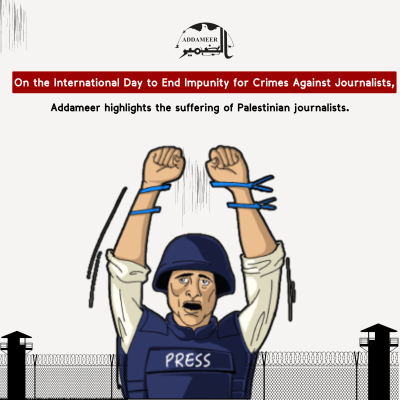
November 2 marks the International Day to End Impunity for Crimes Against Journalists. On this occasion, Addameer sheds light on the suffering of journalists in the occupied Palestinian territories. For decades, Palestinian journalists have faced various forms of violations, including arrest, mistreatment, beatings, and ongoing harassment, even to the extent of being targeted with deadly force.
The occupation has increasingly targeted Palestinian journalists over recent years, reaching a peak in its crackdown on journalism in the occupied Palestinian territories following the onset of the ongoing Israeli aggression and genocidal war against the Palestinian people on October 7. Since that date, the occupation forces have killed over 180 Palestinian journalists. Prisoner organizations have documented more than 132 cases of arrests of Palestinian journalists since October 7, with 35 orders of administrative detention issued in total since October 7. Currently, 67 journalists are held in occupation prisons, including 20 under administrative detention. Approximately 30 journalists have been arrested from Gaza, one of whom died in custody. It is important to note that the number of detainees from Gaza provided by prisoner organizations is incomplete, as the occupation enforces a policy of enforced disappearance, leaving the actual numbers unknown.
The occupation arrests journalists in its prisons, often charging them with incitement. Frequently, arbitrary administrative detention orders are issued against them without any formal charges, and these detention orders are often renewed. This is part of the broader policy of the occupation against all sectors of the Palestinian population.
Journalist Sh. S. from Gaza is facing deliberate medical neglect and mistreatment:
The occupation arrested journalist Sh. S. from the vicinity of Al-Shifa Hospital after it was stormed by the occupation forces on March 18, 2024, while he was actively working as a journalist. During the arrest, they stripped him and others completely after searching them and took them to an unknown location along with dozens of detainees. They were subjected to severe physical assault multiple times. After about 90 days of detention in the occupation camps, which lack even the most basic humanitarian conditions, Sh.S. stated: "Even though I told them that I suffer from several health issues, they treated me harshly, and the interrogation lasted for more than 10 hours."
Journalist Tarek Al-Sharif:
The occupation arrested journalist Tarek Al-Sharif from his home on November 19, 2023, after storming his house in the early morning. He was interrogated about his journalistic work and posts on his personal Facebook account. Tarek recounts, "After about two days of my arrest, I was taken to a Shabak interrogation center near Ofer, where one investigator introduced himself as 'Ahrabi.' I felt he was very hostile. The interrogation lasted about four hours, during which I was handcuffed with my hands in front of me. The focus of the interrogation was on my journalistic work, particularly a segment I conducted on Al-Raya Radio in the morning program on October 8, 2023, as well as other segments from 2021 to 2023. Then, I was returned to my cell. On the eighth day of my detention, a court session was held for me via VC technology, during which my detention was extended for a week on charges of incitement. Later, the occupation issued a sentence against me of 10 months in prison based on my journalistic work.”
Addameer views the administrative and military punitive measures taken by the occupation forces against Palestinian journalists defending human rights as a violation of international humanitarian law. These actions aim to deter and intimidate the Palestinian community and compel them to abandon their inalienable rights. The arrest of journalists is a blatant crime against the Universal Declaration of Human Rights and the Global Declaration on the Protection of Human Rights Defenders. Addameer calls on the international community to take serious action to stop these policies.